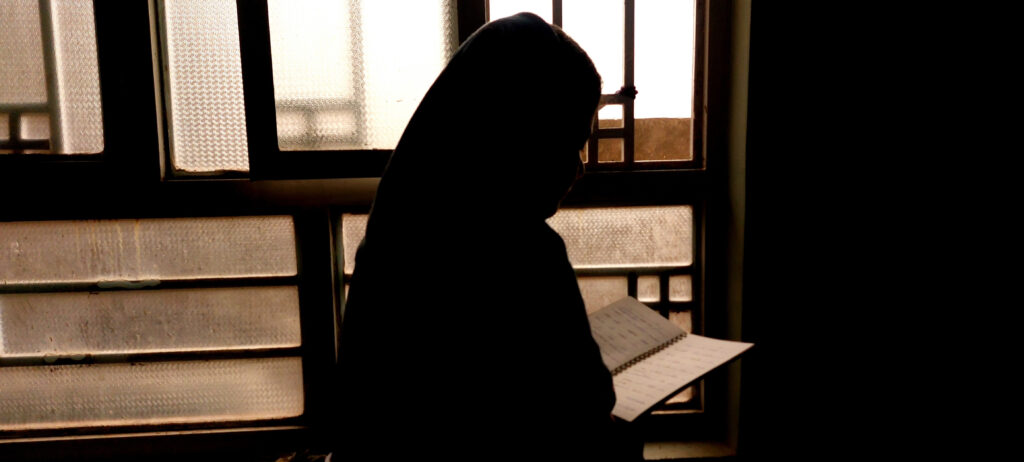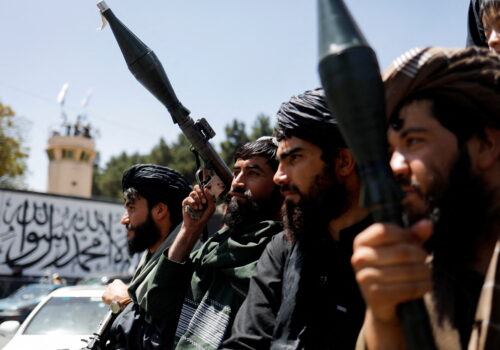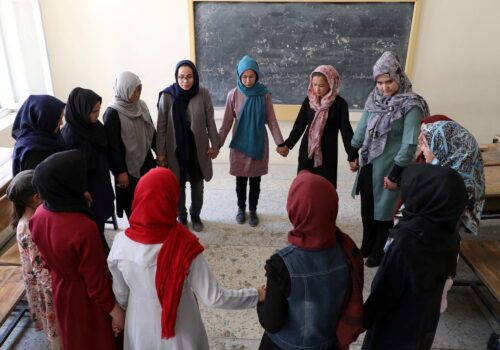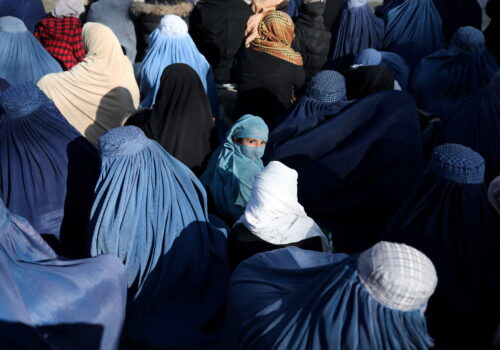As the Taliban tightens its rule in Afghanistan, women face unprecedented threats to their rights and livelihoods. The Taliban’s oppressive regime, described by women of Afghanistan and international experts as gender apartheid, is a stark reminder of the fragile state of gender equality not only in the region, but globally.
Yet, the international community, defined loosely as the collection of United Nations (UN) member states, finds itself unable to emerge as a powerful and unified voice for the women of Afghanistan despite its stated commitments to gender equality. For years, international conventions and declarations have served as inspirations of hope and offered guidelines and principles aimed at safeguarding the rights of women worldwide. Now the people who wrote and advocated for these international standards must translate them into concrete actions to address the world’s most severe women’s rights crisis. These efforts should include codifying gender apartheid as a crime against humanity and prosecuting Afghanistan at the International Criminal Court. Moreover, any international engagement with the Taliban regime must prioritize ensuring its compliance with international law in its treatment of women.
International legal frameworks
Despite critical reports by prominent international organizations such as Amnesty International, Human Rights Watch, and the UN special rapporteur on the human rights situation in Afghanistan, the standing of women and girls in the country continues to deteriorate rapidly. Women inside Afghanistan have bravely taken to the streets, and their counterparts outside the country have advocated for them in numerous international meetings, conferences, and private roundtable discussions. But these demands and protests have so far failed to garner a robust response from existing international legal mechanisms, obligations, or conventions.
Bridging the gap
The fundamental human rights that the women of Afghanistan are demanding are clearly defined in the Convention on the Elimination of All Forms of Discrimination Against Women (CEDAW), the International Covenant on Civil and Political Rights, the International Covenant on Economic, Social and Cultural Rights, and elsewhere. These pivotal frameworks mandate governments and international institutions to actively address women’s needs and provide robust protection against any violations, especially in the complex landscapes of conflict and post-conflict situations.
UN Security Council Resolution (UNSCR) 1325 on Women, Peace, and Security, while nonbinding, expands upon binding conventions by clarifying women’s rights standards, even in states experiencing conflict or those not party to conventions such as CEDAW. The resolution extends its reach beyond governments and states to all parties participating in conflicts.
While UNSCR 1325 does not have direct legal enforcement mechanisms, it carries significant political weight. The resolution “calls upon all parties to armed conflict to respect fully international law applicable to the rights and protection of women and girls” under the relevant conventions and to “bear in mind the relevant provisions of the Rome Statute of the International Criminal Court.” The resolution further calls upon all parties to armed conflicts to “take special measures to protect women and girls from gender-based violence, particularly rape and other forms of sexual abuse, and all other forms of violence in situations of armed conflict.” The resolution has promoted actions at the national, regional, and international levels. Civil society organizations, international actors, and UN bodies regularly monitor and assess progress on the implementation of the resolution and call for greater accountability mechanisms to ensure that commitments are translated into action.
As a United Nations member, Afghanistan ratified CEDAW in 2003 and adopted UNSCR 1325 in 2015, affirming its commitment to international legal obligations and the promotion of the rule of law. The Islamic Republic of Afghanistan successfully submitted its periodic reports to the CEDAW committee and its status reports on the implementation of the national action plan on UNSCR 1325. Under the Taliban’s rule, Afghanistan has disregarded such established international mechanisms and is no longer abiding by any of these international obligations.
The group’s continued enforcement of oppressive policies and the lack of international accountability has reduced international standards aimed at protecting women’s rights to nothing more than empty rhetoric. Consequently, Afghan women and girls turn to the international community for robust advocacy and support, urging for their voices to be heard and for the use of all available international mechanisms on their behalf.
To date, the international community has failed to deliver. Countries with feminist foreign policies have sought to exert pressure on the Taliban regime and demand the protection of Afghan women’s rights through soft diplomatic meetings and statements. The recent statement issued by the foreign ministers of the Feminist Foreign Policy Network regarding the plight of women in Afghanistan, for example, employed significantly stronger language than their previous statements since August 2021, as they called on the international community to redouble its efforts to leverage all available legal instruments to end the systematic and egregious violations of international law against women. This call has not yet led to meaningful action.
The way forward
To effectively protect and promote women’s rights, it is imperative that members of the international community first agree to refrain from any form of engagement with the Taliban that contradicts their commitments and obligations under international law. This requires a coherent and unified approach, as well as proactive accountability measurements, to avoid contradictory behavior that would undermine the objectives of promoting women’s rights and ending violence against women in Afghanistan. Nevertheless, expecting an illegitimate group such as the Taliban to adhere to international frameworks concerning women’s rights is unlikely to yield significant results.
But the international community, in collaboration with civil society organizations, nongovernmental organizations, and human rights groups, can take proactive measures toward ensuring accountability. One significant step would be to codify gender apartheid as a crime against humanity. By leveraging the instruments provided by binding conventions such as CEDAW, the international community could establish legal frameworks that explicitly recognize and condemn systematic gender-based discrimination and persecution. Over the past three years, there has been significant documentation of gender-based persecution in Afghanistan, including last month’s report from the UN special rapporteur on the human rights situation in Afghanistan. The next step would be for state parties to CEDAW to pursue a case against Afghanistan at the International Court of Justice, either individually or through joint initiatives.
The CEDAW committee should support the re-establishment of Afghanistan’s CEDAW steering committee, technical committee, and drafting committee, both within the country and among Afghan communities in exile. While the current authorities of Afghanistan refuse to provide periodic reports, the committees of experts should be tasked with providing shadow reports.
Moreover, it is imperative for the International Criminal Court to collaborate closely with relevant states and international organizations such as UN bodies, as well as civil society organizations and other stakeholders, to garner support for its investigation into the Taliban’s treatment of women, particularly regarding crimes against humanity such as gender persecution.
The United Nations must adhere to fundamental principle before considering any form of “structured engagement” with the Taliban—a form of cooperation recommended in the independent report by UN Special Coordinator Feridun Sinirlioğlu. The UN should first prioritize the implementation of UNSCR 1325 and other relevant resolutions, ensuring that the rights and needs of women are fully integrated into its strategies and initiatives, including by facilitating direct discussions between women and the Taliban.
UN Women, in close collaboration with relevant states, must prioritize the revitalization of the focal points in Afghanistan’s UNSCR 1325 national action plan, which was established in 2017. These focal points, people who represented the relevant ministries and civil society organizations before the Taliban takeover, play a pivotal role in guaranteeing the participation of Afghan women in all dialogues. New focal points could be established under the auspices of the UN Assistance Mission in Afghanistan, UN Women, or even the European Union delegation in Afghanistan. The international community must prioritize Afghanistan as a paramount concern in its policy agenda and cease engaging in actions and diplomatic meetings that inadvertently bolster the Taliban’s sense of superiority and embolden similar fundamentalist groups worldwide. The future of Afghan women and the international commitment to gender equality hangs in the balance.
Parwana Paikan is the minister counsellor of the embassy of Afghanistan in France and co-founder of Conseil des Femmes Franco-Afghan. She previously served as deputy director general of human rights and women’s international affairs at the Ministry of Foreign Affairs of Afghanistan.
Further reading
Thu, Mar 14, 2024
Why the Taliban’s persecution of women meets the bar of a crime against humanity
Inside the Taliban's gender apartheid By Azadah Raz Mohammad
Codifying gender apartheid as a crime against humanity is an important step toward holding the Taliban accountable.
Thu, Mar 7, 2024
Inside Afghanistan’s gender apartheid: Listen as women reveal the impact of the Taliban’s oppressive decrees
Inside the Taliban's gender apartheid By
Since the Taliban's takeover of Afghanistan in August 2021, women have battled against increasingly severe restrictions on education, employment, and daily public life. This report, a joint effort by the Civic Engagement Project and the Atlantic Council’s South Asia Center, underscores their remarkable resilience and unyielding spirit in the face of gender apartheid.
Thu, Mar 7, 2024
Twice under the Taliban: The repeated nightmare of my generation
New Atlanticist By
The deepening human rights crisis under the Taliban underscores the dire need for global attention on the plight of Afghanistan’s women.
Image: Furusan reads in a notebook. The 15-year-old wanted to become a lawyer, but now she is barred from attending school. In Afghanistan, the new school year began on March 20, 2024 - but for older girls, the school gates remain closed for the third year in a row. Under the ruling Islamist Taliban, education for girls from the seventh grade is now prohibited for the third school year in a row, and women are no longer allowed to attend universities. Fariba Akbari/dpa via Reuters.



